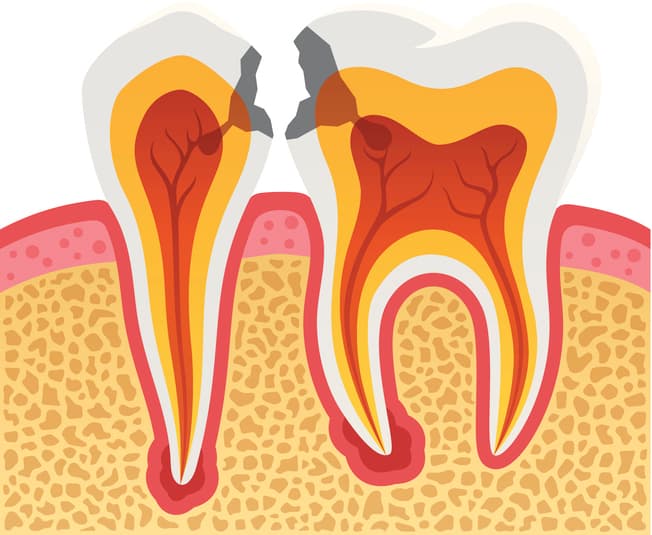 What Is a Tooth Abscess?
What Is a Tooth Abscess?
A tooth abscess is a bacterial infection found in the inner part of the tooth where pus has collected and can cause moderate to severe pain in people who suffer from the condition. Tooth abscesses can occur when a cavity has gone untreated for too long or when a crack or chip in the tooth allows bacteria to find its way into the dental pulp (the inner, soft part of the tooth) area of the tooth and gets infected.
Once the bacteria has made its way inside, it can spread down to the root and cause both inflammation and swelling. Once inflammation occurs, it will force the pus into a tight space (known as the abscess) at the tip of the root where the swelling exists.
Symptoms
Signs and symptoms of a tooth abscess may include:
- Persistent, throbbing or severe toothache
- Extreme temperature sensitivity, hot & cold
- Pain when performing normal chewing or biting
- Fever
- Swelling in the face or the cheeks
- Lymph nodes under the jaw or in the neck become tender or swollen
Other Risk Factors
The following factors may increase your risk of a tooth abscess:
- Poor Dental Habits — If you don’t brush or floss every day (preferably twice or more a day), this can significantly increase your risk of further dental and oral complications like gum disease, tooth abscesses and tooth decay.
- A High-Sugar Diet — Too much sugar is bad for your body and is especially hard on your teeth. Sodas, sweets and other foods high in sugar content can cause cavities, which may turn into infections or tooth abscesses.
- Other Health Issues — Do you have diabetes or any other kind of autoimmune disease? If so, these can certainly increase your likelihood of getting a tooth abscess, so proper dental care and regular checkups are essential.
When Should You Consult Your Dentist?
If you experience any of the signs or symptoms listed above, you should see your dentist right away, especially if you begin to experience swelling in your face or begin to feel feverish. If your dentist cannot see you immediately, you should go to an emergency room as it’s possible these symptoms indicate the infection is possibly spreading.
Over time you may feel a lessening of pain if the abscess ruptures, but you’ll still likely need to get dental treatment. The infection could spread to other parts of your jaw and beyond to parts of your head and neck and, in a worst-case scenario, lead to sepsis, which is an infection throughout the entire body that can put your life at risk.
Testing and Diagnosing
Beyond regular dental checkups, your dentist may perform a couple of specialized tests to confirm if you have an abscessed tooth :
- Tooth Tapping — An abscessed tooth is often very sensitive to touch or pressure, so your dentist may apply pressure to the tooth in question to determine your pain levels.
- X-rays — An X-ray can help identify an abscess, so your dentist may require taking some to be sure.
Tooth Abscess Treatments
Treating a tooth abscess involves draining the abscess and ridding the area of the infection. The tooth itself may be saved with a root canal treatment, but in some instances, it may need to be removed completely. Leaving a tooth abscess untreated can lead to serious, even life-threatening, complications. Your dentist or oral surgeon may recommend the following:
- Root Canal Procedure — If possible, your dentist will try to save your tooth by performing a root canal. The tooth is cleaned and disinfected on the outside, drilled into and cleaned out, then filled with a safe adhesive cement to restore structural integrity.
- Extraction — Extracting the tooth is the last resort, but if the tooth cannot be saved, your dentist will elect to choose this option to preserve the health of the rest of your mouth. Once extracted, the abscess will be fully drained and cleaned to prevent further infection.
- Antibiotics — If the infection is localized around the abscessed area, you may not need antibiotics. However, if the infection has spread beyond it, your dentist will prescribe antibiotics to help slow or diminish the infection.
While the area is healing, your dentist may recommend that you regularly rinse your mouth with warm saltwater and take over-the-counter pain relievers as needed to help ease any discomfort you may encounter.
Keeping Your Mouth Healthy
You can help prevent a possible tooth abscess by taking proper care of your teeth, eating a healthy diet and getting regular dental checkups and cleanings. Here are some general guidelines to ensure you have a happy and healthy mouth.
- Drink fluoridated water.
- Use fluoride toothpaste when brushing twice a day (or after every meal).
- If your brush bristles become frayed, replace your toothbrush. Or, simply replace it every three to four months as a general rule.
- Floss daily with dental floss or an interdental cleaner.
- Use an antimicrobial or fluoride mouthwash to help rid your mouth of any leftover food particles after meals.
- Eat a more balanced and sugar-free diet.
- Get regular dental checkups and cleanings from your dentist.
If you have questions about your oral care routine or feel like you may be experiencing the early stages of a tooth abscess, contact your dentist for an examination. Your dentist will answer your questions and determine if you need treatment for a tooth abscess.
